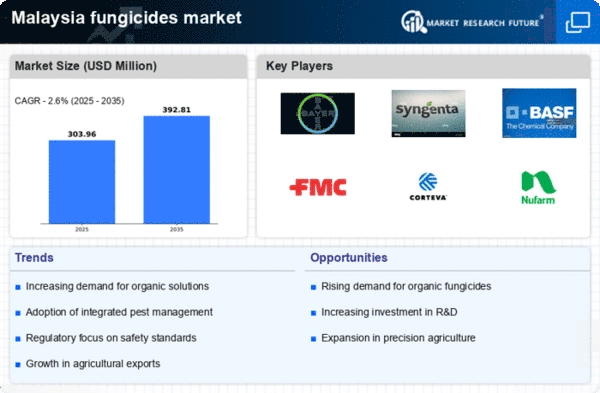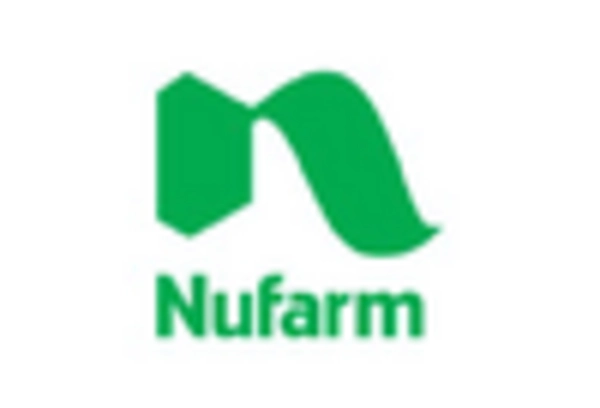Government Initiatives and Support
The Malaysian government is actively promoting agricultural productivity through various initiatives, which positively influences the fungicides market. Programs aimed at enhancing crop protection and increasing food security are encouraging farmers to invest in fungicides. Financial incentives and subsidies for purchasing agricultural inputs, including fungicides, are likely to boost market growth. Recent reports indicate that government spending on agricultural support has increased by 15% in the last fiscal year, which may further stimulate demand for fungicides. This supportive environment presents a favorable landscape for stakeholders in the fungicides market.
Climate Change Impact on Crop Diseases
Climate change is altering weather patterns in Malaysia, leading to an increase in the prevalence of crop diseases. Warmer temperatures and unpredictable rainfall create favorable conditions for fungal pathogens, which poses a challenge for farmers. As a result, there is a heightened need for effective fungicides to manage these emerging threats. The fungicides market is expected to see a surge in demand as farmers seek solutions to protect their crops from these climate-induced diseases. This trend suggests that companies focusing on research and development of new fungicides may find lucrative opportunities in the Malaysian market.
Rising Demand for Sustainable Agriculture
The increasing emphasis on sustainable agricultural practices in Malaysia is driving the growth of the fungicides market. Farmers are increasingly adopting eco-friendly methods to enhance crop yield while minimizing environmental impact. This shift is reflected in the rising demand for fungicides that are less harmful to beneficial organisms. According to recent data, the market for organic fungicides is projected to grow at a CAGR of 8% over the next five years. This trend indicates a significant opportunity for manufacturers to innovate and develop products that align with sustainable practices, thereby expanding their market share in the fungicides market.
Technological Innovations in Crop Protection
Technological advancements in crop protection are reshaping the fungicides market in Malaysia. Innovations such as precision agriculture and integrated pest management are enabling farmers to apply fungicides more effectively and efficiently. The adoption of smart farming technologies is expected to enhance the efficacy of fungicides, leading to better crop health and yield. As farmers increasingly embrace these technologies, the demand for advanced fungicides that complement these practices is likely to rise. This trend indicates a potential for growth in the fungicides market as technology continues to evolve.
Increasing Awareness of Crop Health Management
There is a growing awareness among Malaysian farmers regarding the importance of crop health management, which is driving the fungicides market. Education and training programs focused on integrated pest management and disease prevention are encouraging farmers to adopt fungicides as a critical component of their crop management strategies. This heightened awareness is reflected in the increasing sales of fungicides, which have shown a growth rate of approximately 10% annually. As farmers recognize the value of maintaining healthy crops, the demand for effective fungicides is expected to continue its upward trajectory in the Malaysian market.
















